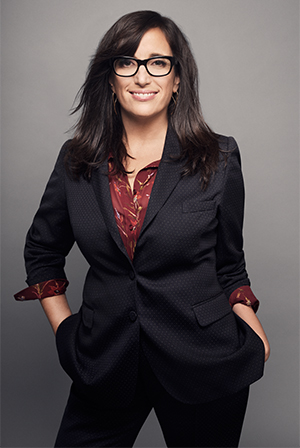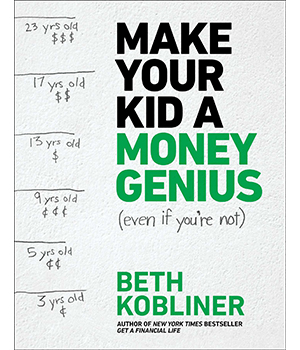Parents, it’s time to talk about money.

“Parents know they have to talk about sex, they have to talk about drugs, they have to talk about alcohol, but money is one of those that we all probably feel we can slide by without talking about it,” Beth Kobliner says.
Kobliner is the New York Times best-selling author of “Make Your Kid a Money Genius (Even If You’re Not): A Parents’ Guide for Kids 3 to 23,” which she wrote to help parents as they begin teaching kids about money. She is also the creator of the site MoneyAsYouGrow.org and was selected by President Barack Obama for the President’s Advisory Council on Financial Capability for Young Americans. She recently spoke at a Family Action Network event.
“Talking with parents throughout my career, they always express an anxiety about money,” Kobliner says. “Most of the time people are worried about whether they’re doing the right thing. They’re concerned about their own credit card debt or the fact that they haven’t been investing in the market. And I think the idea of revealing that to your kids, the idea that they really aren’t very good about money, I think is a lot of baggage to carry.”
Despite this, Kobliner thinks teaching kids about money should be easier than talking about other topics like sex and drugs.
“I think unlike the sex talk, when your kid asks you and you kind of have to take that moment in time to have a good long talk about it or respond to questions, I think money should be easier because it’s so integral in everything you do.”
 For example, Kobliner’s editor told her that he would have never considered taking his 10-year-old car shopping with him. But, after reading her book, and after his daughter asked questions about what he was doing, he brought her along. They discussed car prices, how he could negotiate and what interest rate he was looking for. He said the experience was fun and interesting for his daughter.
For example, Kobliner’s editor told her that he would have never considered taking his 10-year-old car shopping with him. But, after reading her book, and after his daughter asked questions about what he was doing, he brought her along. They discussed car prices, how he could negotiate and what interest rate he was looking for. He said the experience was fun and interesting for his daughter.
“It was a way for him to comfortably talk to her rather than saying, ‘Let’s sit down and talk about compound interest,’” Kobliner says. “I don’t think it really works that way.”
But what if your kids have grown up?
“This is one of those things when it’s never too late,” Kobliner says. “Even though the research shows that it’s great to talk early and that has a big impression — starting at age three they understand many concepts, and by eight some of those behaviors are set — there are always ways to reinforce or do the opposite, try to break them of [bad] habits […] I think that goes on forever. As long as there are children and parents, there are lessons you can teach them and things to discuss about money. But I do think starting earlier makes it less of a volatile subject or less of a strained thing to talk about.”
To raise a money genius, it’s also important to talk about giving. Kobliner even dedicates an entire chapter on this subject in her book. In addition to sharing giving tips for preschoolers up to young adults, Kobliner points to six organizations that will allow a child’s small donation to make a big impact:
“In the case of giving, I think that’s part of a person’s entire financial outlook,” Kobliner says. “In terms of young children, one of the best recommendations they made for years was put a third of your money in savings, a third of it in money for the future and a third of it in money for giving. That is an excellent way of introducing the idea and it gives kids perspective.
“Kids see advertising in so many ways. It’s not just on TV anymore, but it’s on their phones, on their computers. Advertising is sort of omnipresent. So some kids are left with thinking everybody else is having a great time and spending lots of money and wearing great clothes and why can’t I? And I think now more than ever it’s really important to counter that and say, ‘You know what, there might be things that your friends have or other people have, but there are also people who have nothing of what you have.’ It’s about money, but I also think it’s about values and what’s important to you.”
In her book, Kobliner writes, “If you can, find a project that your whole family can participate in that will make a meaningful impact. Volunteering is a great way to show that money isn’t everything.” And even though she thinks the organizations above are wonderful, she also suggests staying local, choosing “activities that children can see through from contribution to payoff.”
For more tips and insights, watch Kobliner’s entire Family Action Network talk:

